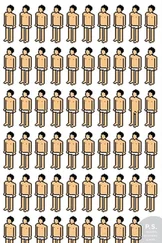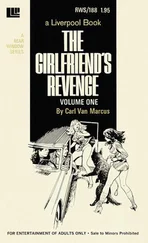The five of us breathing sounded as though we were in a bathyscaphe thousands of feet beneath the ocean surface, looking for those jewels Karen had once thrown from the ocean liner's deck. I sighed— then the truth just coughed out of me like a bubble jellyfishing upward from the deep sea, flattened by extreme pressures, but becoming larger and more full as it nears the surface. I'd been worrying so much about the press and about not wanting Karen to be a freak show. And the family had its own way of trying me: Lois's bossiness and George's lack of interest in Megan. The relief for me was great, as though I had been choking and then Heimlich'ed up a drumstick. My chest relaxed; my muscles slackened. To be able to discuss what I felt for Karen and Megan to people who would listen. My friends didn't speak until I was finished.
"You know, Megan looks so much like you it's scary, Richard," said Pam. "She's you in a wig."
"As if I don't know."
"She's cute," said Pam. "I held her. Linus did, too."
"Yeah," said Linus. "She's sweet. I think I nearly dropped her. She spewed chuck all over my calculator, my TI-55—I'm very sentimental about that machine."
We were all sitting on the rails. Hamilton lit a cigarette. He said, "Well, let's have a bit of pity on her. Fancy having Richard's face and Lois as a substitute mother. Life is cruel."
I wanted to make amends: Godparents?
"Does that mean diapers?" asked Hamilton, scrunching his face. I replied, "Yes, Hamilton, it does. Acres and acres of shit. It's the deal." We sat and talked a bit, just our five voices surrounded byblack. There was a quiet patch. Then Linus leaned down, stuck his ear to the track, and whispered, "Train."
There was no way we could run to the entrance; the five of us hit the ground and rolled into the stony ditches on either side, willing ourselves to shrink. Within seconds, a Pacific Great Western train exploded above in an H-bomb roar—108 freight cars loaded with plywood supernova'ed up above us inside the granite walls. The train radiated intermittent light from which I was able to see directly in front of my nose, pressed to the ground, an empty wine bottle, a six-year-old yellowed newspaper, a sock, and a balled-up Huggies diaper. These objects flashed briefly and vanished like fleeting shivers of shame that are soon forgotten, never again to see the light of day. It felt strange to see these castaway things deep inside the Earth, never to return to the surface.
The train passed above us for five minutes. What if we were to die right there? What had our lives been? What had our ambitions been? What had we been seeking? Money? No—none of us seemed financially motivated. Happiness? We were so young that we didn't even know what unhappiness could be. Freedom? Perhaps. An overriding principle of our lives then was that infinite freedom creates a society of unique, fascinating individuals. Failure at this would mean failure of our societal duty. We were young; obviously we wanted meaning from life. I felt a craving for duty, but to what?
Meanwhile, the creosote on the railway ties stank and burned my nose, and my elbow rested in dirt. Small tornadoes of litter scraped my face and I closed my eyes. I tried to curl up and close my body to protect myself from the train's roar—the noise of the center of the Earth.
Dreams have no negative. This is to say that if, during the day, you think about how much you don't want to visit Mexico, your dreams at night will promptly take you to Mexico City. Your body will ignore the "no" and only pay attention to the main subject. I think we thought daily of avoiding tribulations—and of avoiding loss.
The train passed. Our ears throbbed with the silence. We stood up and somberly walked out to the tunnel's entrance and into the rain.We climbed into Linus's van and drove over to see Megan. I hoped Lois would be gracious and permit four new godparents to share in Megan's adoration.
Linus asked, "Three months old—does she speak yet?"
"No, goofball," said Hamilton, "she's too busy generating random numbers to speak."
I nodded. "I do hate to say this, but poor little Megan really is going to grow up to resemble me wearing a Bumhead wig."
"I didn't know you and Karen were, uh, doing it," said Hamilton. "I mean, if you were, it was one heckuva secret."
"Go figure," I said, then we drove off, everybody yacking and— except for me—catching up on life. I was remembering Karen saying, "Are we gonna do it or what?" Remembering the delicate birds and butterflies and flowers that passed between our bodies. I was remembering her determination that last day that she was awake. Would she have been like that always? Or had she known time was running out? Was she trying to squish as much into a day as she could?
That month I had read a science fiction story, Childhood's End. In it, the children of Earth conglomerate to form a master race that dreams together, that collectively moves planets. This made me wonder, what if the children of Earth instead fragmented, checked out, had their dreams erased and became vacant? What if instead of unity there was atomization and amnesia and comas? This was the picture posited by Karen: She saw something in her mind—in between the smaller bikini and the itty-bitty bits of Valium, in between putting on a down coat or a ski boot one cold winter day, or maybe turning a TV channel or rounding a corner in her Honda. She saw a picture, however fragmentary, that told her that tomorrow was not a place she wanted to visit—that the future is not a place in which to be. This is what haunted me—the thought that maybe she was right.
9 EVEN MORE REAL THAN YOU
Half a year after giving birth to Megan, Karen was moved permanently to a room of her own in a local nursing home then called Inglewood Lodge. On her bedside table sat moisturizers, costume jewelry, a wooden hair brush, Kleenex in a pink ruffled box, birthday cards rigorously kept up to date, framed family photos, stuffed animals (one Garfield cat, two teddy bears, one polar bear), books for visitors—The Best of Life and Jonathan Livingston Seagull—plus a dieffenbachia vine that eventually colonized the entire room. Her radio was frequently left on for hours at a time.
Karen's "day" would technically begin near midnight when her body would be turned over by lifting her up from her "intermittent pressure" anti-bedsore mattress. At this same time, her garments would be inspected to see if they required changing. Karen would be rolled over two more times between midnight and 6:00 A.M.; as well, her mouth would be brushed with a soft toothbrush then swabbed with a flavored sponge; Vaseline would be applied to her lips.
Twice a week in the morning Karen would have a proper bath, during which time she would have "range of motion" exercises— shoulder, arm, extensors, abductors, and all joints flexed by a nurse's aide. On other days she had sponge baths and motion exercises.
During Karen's awake cycles, food from inside a suspended bag would be gravity-fed into her stomach through a J-tube (jiugiostomy tube) that was permanently attached to a valve near her belly button.
After being clothed in special front-only garments, Karen would be placed into a geriatric wheelchair with a buttocks pad and a device to hold her head up straight. She would attend all breakfasts, lunches, and dinners held at the lodge, as well as special events such as films and birthday parties and even a church service that was usually, but not always, held on Sunday. In between meals Karen sat in her chair in her room, and her position was frequently moved by staff.
Karen was atypical in that she had few of the normal afflictions of the comatose: pneumonias, bowel obstructions from lack of fiber, urinary tract infections, blood clots in the legs, seizures, ruptured stomach, skin breakdowns, and skin infections from lack of blood circulation.
Читать дальше










